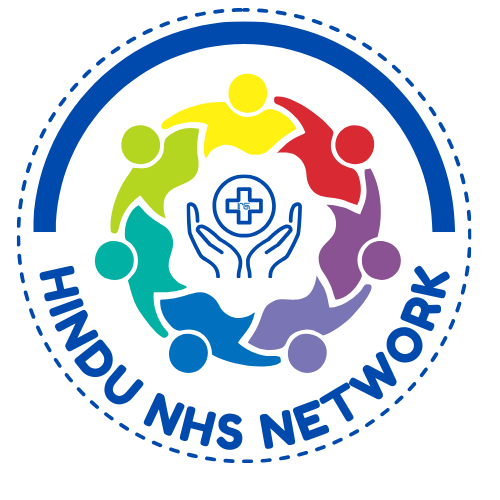At the core of the Hindu NHS Network’s mission is a profound dedication to advocating for culturally appropriate, spiritually respectful, and equitable care for Hindu patients and their families. In an increasingly diverse NHS, it is essential that the care provided honours not only the clinical needs of patients but also their cultural identity, dietary practices, family dynamics, and spiritual values. The Hindu NHS Network (HNN) works tirelessly to ensure that the voices, preferences, and traditions of Hindu patients are not only heard but deeply understood, respected, and integrated into care delivery across the healthcare continuum.
Patient advocacy within HNN begins with education and awareness. Many healthcare providers, though well-intentioned, may not be aware of the nuances of Hindu practices, such as sacred rituals during birth, illness, and end-of-life; preferences for vegetarian diets or sattvic food; gender-specific modesty considerations; or the significance of prayer, chanting, and family involvement during hospitalisation. We create and disseminate comprehensive guidance documents, training modules, and on-demand workshops to Trusts, hospitals, hospices, and care homes, helping frontline staff gain practical knowledge of Hindu beliefs and values. This includes providing clarity on topics such as the use of sacred threads (janeu), handling of religious symbols, palliative care customs, post-mortem rituals, and the importance of spiritual recitations like the Bhagavad Gita or Vishnu Sahasranama during critical moments.
Our patient advocacy efforts are also structurally embedded within NHS frameworks. We work with Patient Experience and Equality & Diversity leads to co-create Hindu Faith & Belief Guidelines for Trusts, which include policies on prayer room access, festival recognition (e.g., Diwali, Navratri, Raksha Bandhan), religious dietary labeling in hospital menus, and proactive chaplaincy engagement for Hindu patients. HNN regularly consults on policy reviews to ensure that cultural and religious needs are included not as afterthoughts, but as integral aspects of personalised, compassionate care.
For families navigating complex hospital journeys—such as terminal illness, mental health treatment, pregnancy loss, or ICU care—HNN provides a trusted bridge. Through our Patient Advocacy Helpline and Volunteer Hindu Chaplains, we offer emotional, spiritual, and procedural support to families who may struggle to express their needs within a clinical system. We help interpret care decisions in line with dharmic values, ensure appropriate spiritual support is made available, and work to resolve misunderstandings that may arise due to cultural gaps or communication barriers. Our advocates are trained not only in healthcare navigation but in empathy, cultural humility, and sacred listening.
A particularly vital area of advocacy is end-of-life care and bereavement support. Hindu families often face distress when rapid hospital protocols clash with religious customs around death rites, body handling, and cremation timing. HNN supports trusts to develop Rapid Discharge Pathways, mortuary respect protocols, and chaplain liaison services that uphold the sanctity of Hindu beliefs at the time of death. We also offer printed and digital materials for clinicians, explaining key Hindu principles such as karma, the atman (soul), moksha (liberation), and the sacred role of rituals during dying.
In addition to individual support, HNN also engages at the policy and research level, working with NHS England, Public Health authorities, and academic partners to examine how Hindu patients experience healthcare and how disparities can be addressed. We advocate for inclusive data collection, culturally adapted clinical pathways, and the involvement of Hindu voices in Patient Participation Groups (PPGs), Ethics Committees, and Quality Improvement teams. We support Hindu patients and carers to become lived experience advisors so that their insights can inform systemic change.
Moreover, we acknowledge that advocacy is not a one-size-fits-all process. The Hindu community itself is richly diverse—linguistically, regionally, ritually, and philosophically. As such, HNN engages with multiple sampradayas (traditions), community leaders, and local Mandirs to ensure our advocacy reflects this beautiful plurality. We respect that while some families may follow Vaishnavite traditions, others may observe Shaivite, Shakta, Arya Samaj, or Sanatan Dharma customs—and all deserve equal respect and consideration.
Ultimately, patient advocacy through HNN is an expression of Seva (selfless service). We advocate not just for improved clinical outcomes but for care that honours human dignity, fosters trust, and provides healing for the body, mind, and spirit. When Hindu patients feel seen, safe, and spiritually supported, their families are more engaged, their health outcomes improve, and the entire system becomes more compassionate and inclusive. Through our patient advocacy, we uphold the sacred dharma of caring for all beings as reflections of the divine.
Copyright 2025 By Hindu NHS – Designed By Superchatpal






